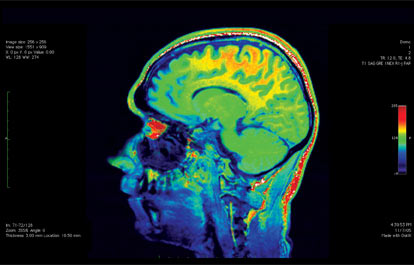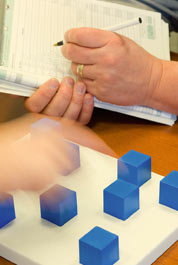

MRN in the News //
Persisting brain abnormalities four months post mild traumatic brain injury in children
October 20, 2022
Clinicians who treat children with mild traumatic injury (mTBI or concussions) currently have limited options for understanding the effects of injury on brain structure and function. Therefore, care providers do not really know about when the brain actually heals relative to clinical recovery (when the child says they feel better). A new study suggests that concussions result in changes to the brain’s white and grey matter microstructure that are not readily detected using traditional neuroimaging techniques. More importantly, these injuries may persist after the majority of children have reported symptom resolution. These findings may therefore have important implications about when it is truly safe for a child to resume physical activities that may produce a second concussion, potentially further injuring to an already vulnerable brain.
Concussion’s Damage to Brain Lingers After Symptoms Fade: Study
November 20, 2013
HealthDay News -- Months after concussion symptoms such as dizziness, headaches and memory loss fade, the brain continues to show signs of injury, a new study suggests.
Comparing 50 concussion patients with the same number of healthy people, researchers found that the brains of those suffering concussions showed abnormalities four months later. This happened despite the fact that their symptoms had already eased to some degree.
The findings may sway conventional thinking about when it's safe to resume physical activities that could produce another concussion, the study authors said.
MRN and UNM Introduce ‘Brain Safe’ Project to Understand and Minimize Concussions on NCAA Athletes
October 9, 2013
Brain Safe Project to examine UNM athletes’ brains over course of careers
The nonprofit Mind Research Network (MRN) has partnered with the University of New Mexico (UNM) to introduce Brain Safe, an innovative, state-of-the-art sports-related concussion assessment program designed to study and minimize the impact of brain injury on NCAA athletes in contact sports.
More than 200 UNM athletes will receive a noninvasive MRI scan of brain structure, chemistry, connectivity and function at the beginning every season. Every year, or after any acute injury, the athlete will be scanned again and the results will be compared to their initial baseline MRI. Using this ‘within-subject’ design, the athlete’s baseline MRI scans can be precisely compared to post-injury scans. Highly sophisticated MRI analyses will be performed using algorithms developed by MRN and UNM scientists to identify any brain related injuries.
Dr. Kent Kiehl’s Lab featured on PBS’s “Brains On Trial” with Alan Alda
September 24, 2013
"Brains on Trial" with Alan Alda aired on PBS in two episodes September 11th and 18th. The Kiehl lab was featured in the second episode. To view the episodes for "Brains on Trail" and more information, please visit: http://www.pbs.org/program/brains-trial/
Mind Research Network Awarded $15 Million Grant
July 22, 2013
Mind Research Network Awarded $15 Million Grant to Develop New Tools to Better Understand the Human Brain and Mental Illness
Center for Biomedical Research Excellence Receives Prestigious Award From the National Institutes of Health
ALBUQUERQUE, NM--(Marketwired - Jul 22, 2013) - The Center for Biomedical Research Excellence (COBRE) at Mind Research Network (MRN), in partnership with the University of New Mexico, has received a grant worth $15 million to study mental illness, positioning the institute as leader in brain imaging. Similar to the goal of the National Institutes of Health (NIH) BRAIN Initiative, the grant seeks to use evolving neurotechnologies to better understand brain disorders.
This award allows COBRE to expand its research on psychosis and mood disorders. The grant represents the second phase of the NIH Institutional Development Award (IDeA) funding for the Multidomal Imaging of Neuropsychiatric Disorders (MIND) study conducted by COBRE.
Mind Research Network Scientist Vince Calhoun, PH.D., Receives Two Prestigious Academic Designations
November 29, 2012
Future Tense Event Recap: Will Neurolaw Change the Judicial System—and Does Free Will Exist?
October 22, 2012
Future Tense Event Recap: Will Neurolaw Change the Judicial System—and Does Free Will Exist?
Mind Over Matter: fMRI Imaging Peers into the Brain’s Activities
October 12, 2012
Mind Over Matter: fMRI Imgaing Peers into the Brain's Activities
How Electrical Brain Stimulation can Change the Way We Think
April 20, 2012
How Electrical Brain Stimulation can Change the Way We Think
Zap Your Brain Into the Zone: Fast Track on Pure Focus
February 6, 2012
Amping Up Brain Function: Transcranial Stimulation Shows Promise in Speeding Up Learning
December 9, 2011
Amping Up Brain Function: Transcranial Stimulation Shows Promise in Speeding Up Learning
Association of Material Interaction with Emotional Regulation in 4 and 9 Month Infants During the…
December 6, 2011
MRN and the Airforce Team to Raise the Bar with Military Decision Making
October 26, 2011
MRN and the Airforce Team to Raise the Bar with Military Decision Making
Expect the Unexpected: Incidental findings create challenges in neuroimaging research
August 2, 2010
Expect the Unexpected: Incidental findings create challenges in neuroimaging research

